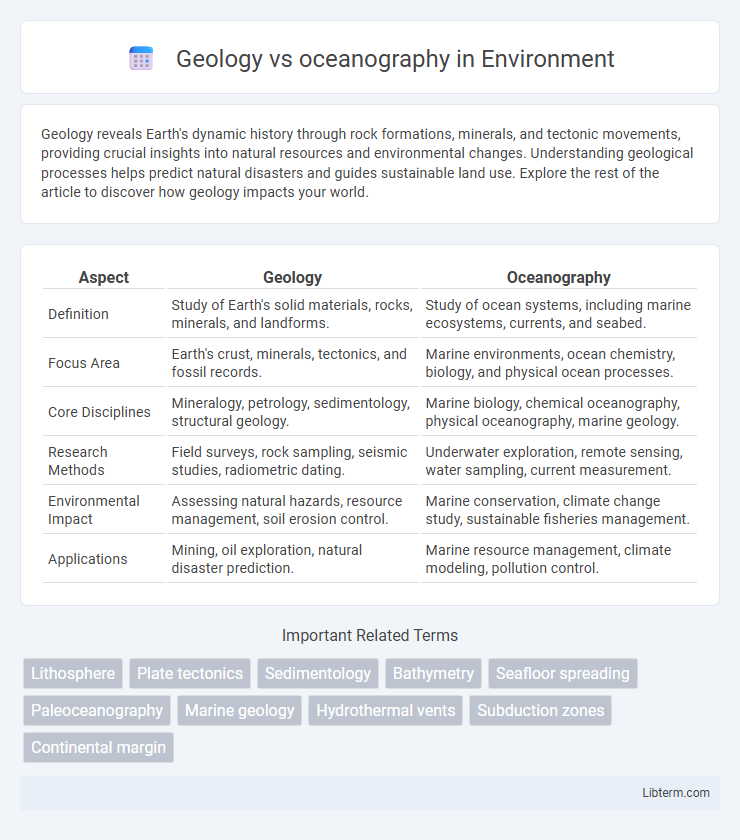Geology reveals Earth's dynamic history through rock formations, minerals, and tectonic movements, providing crucial insights into natural resources and environmental changes. Understanding geological processes helps predict natural disasters and guides sustainable land use. Explore the rest of the article to discover how geology impacts your world.
Table of Comparison
| Aspect | Geology | Oceanography |
|---|---|---|
| Definition | Study of Earth's solid materials, rocks, minerals, and landforms. | Study of ocean systems, including marine ecosystems, currents, and seabed. |
| Focus Area | Earth's crust, minerals, tectonics, and fossil records. | Marine environments, ocean chemistry, biology, and physical ocean processes. |
| Core Disciplines | Mineralogy, petrology, sedimentology, structural geology. | Marine biology, chemical oceanography, physical oceanography, marine geology. |
| Research Methods | Field surveys, rock sampling, seismic studies, radiometric dating. | Underwater exploration, remote sensing, water sampling, current measurement. |
| Environmental Impact | Assessing natural hazards, resource management, soil erosion control. | Marine conservation, climate change study, sustainable fisheries management. |
| Applications | Mining, oil exploration, natural disaster prediction. | Marine resource management, climate modeling, pollution control. |
Introduction to Geology and Oceanography
Geology studies Earth's solid materials, including rocks, minerals, and tectonic processes that shape the planet's structure and history. Oceanography explores the physical, chemical, biological, and geological aspects of the oceans, focusing on marine ecosystems, ocean currents, and seabed composition. Both fields interlink in understanding Earth's dynamic systems but emphasize different elements: terrestrial formations for geology and marine environments for oceanography.
Defining Geology: The Study of Earth
Geology is the scientific study of the Earth's solid materials, including rocks, minerals, and the processes that shape the planet's structure over time. It encompasses the analysis of Earth's crust, plate tectonics, volcanic activity, and sediment formation to understand the planet's history and evolution. Unlike oceanography, which focuses on marine environments and oceanic processes, geology primarily investigates terrestrial features and Earth's internal dynamics.
What Is Oceanography? Exploring the Oceans
Oceanography is the scientific study of the physical, chemical, biological, and geological aspects of the ocean, encompassing the exploration of marine ecosystems, ocean currents, and seabed geology. It integrates data from marine biology, chemistry, and geophysics to understand ocean dynamics, marine life distribution, and the impact of climate change on ocean systems. Oceanographers use advanced technologies such as remote sensing, underwater robotics, and satellite imagery to map ocean floors, analyze water composition, and monitor oceanographic processes.
Core Differences Between Geology and Oceanography
Geology focuses on the study of Earth's solid materials such as rocks, minerals, and the processes that shape the Earth's structure, including plate tectonics and volcanic activity. Oceanography examines the physical, chemical, biological, and geological aspects of the ocean, emphasizing marine ecosystems, ocean currents, and sea floor mapping. While geology centers on terrestrial processes, oceanography integrates multiple scientific disciplines to explore the marine environment comprehensively.
Overlapping Areas: Where Geology Meets Oceanography
Geology and oceanography intersect primarily in marine geology, where the study of the seafloor's structure, sediment composition, and tectonic activity reveals insights about Earth's history and natural resources. Investigations of submarine volcanoes, hydrothermal vents, and sediment deposition link geological processes with oceanographic dynamics. This overlap enhances understanding of plate tectonics, ocean basin formation, and the impact of geological events on marine ecosystems.
Research Methods in Geology vs Oceanography
Research methods in geology primarily involve fieldwork techniques such as rock sampling, stratigraphic analysis, and geochronology to study Earth's solid materials and processes. Oceanography employs remote sensing, sonar mapping, and water column sampling to analyze oceanic physical, chemical, and biological properties. Both disciplines integrate geospatial data and modeling tools to interpret Earth's dynamic systems from different environmental perspectives.
Careers and Applications in Geology and Oceanography
Geology careers involve studying Earth's physical structure, minerals, and processes, with applications in natural resource exploration, environmental consulting, and hazard assessment. Oceanography focuses on marine environments, offering careers in marine biology, climate research, and underwater technology development, supporting ocean conservation and resource management. Both fields contribute crucial insights to environmental sustainability, disaster preparedness, and scientific advancement in Earth and marine systems.
Major Discoveries in Geology and Oceanography
Major discoveries in geology include the identification of plate tectonics, which revolutionized the understanding of Earth's crust dynamics and continental drift. Oceanography's pivotal findings involve mapping the Mid-Ocean Ridge and uncovering the complex systems of ocean currents that regulate global climate. Both sciences rely on advanced technologies like seismic imaging and remote sensing to explore Earth's solid and marine environments, respectively.
Current Challenges and Future Directions
Geology faces challenges in understanding subsurface processes and the impact of climate change on Earth's structure, requiring advanced seismic imaging and predictive modeling. Oceanography struggles with mapping deep-sea ecosystems and assessing ocean acidification effects, necessitating improved autonomous exploration technologies and long-term ecological monitoring. Both fields are moving towards integrating big data analytics and remote sensing to enhance predictive accuracy and resource management.
Conclusion: Comparing Geology and Oceanography
Geology and oceanography both investigate Earth's physical properties but differ in focus; geology centers on the solid Earth, including rocks and landforms, while oceanography explores marine environments, water processes, and ecosystems. The integration of geological and oceanographic data is essential for understanding coastal dynamics, natural hazards, and climate change impacts. Collaboration between these disciplines enhances resource management and environmental conservation efforts.
Geology Infographic

 libterm.com
libterm.com